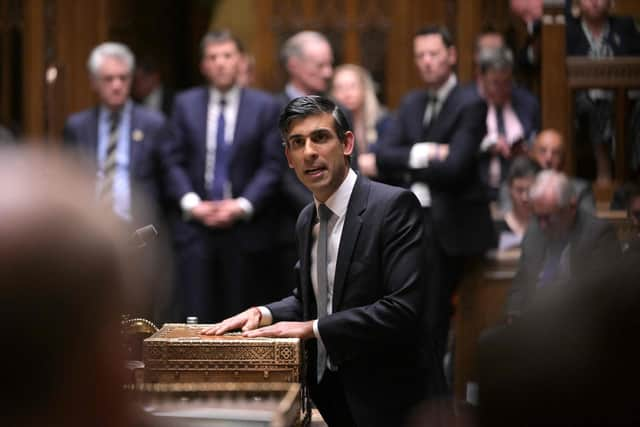The Windsor Framework – how egg sandwiches and late nights fuelled the Northern Ireland deal
and live on Freeview channel 276
There was no single eureka moment as the two sides spent many late nights and long hours trying to find a deal, often fuelled by underwhelming egg sandwiches in Brussels. Instead, it was a long, hard slog towards a final arrangement that intensified after Mr Sunak entered Downing Street.
A more constructive tone since Prime Minister's arrival in No 10 has been pointed to as one of the reasons behind the breakthrough, as publicly, Mr Sunak and his top Cabinet ministers sought to reset relations with the EU after the more turbulent tenures of Boris Johnson and Liz Truss.
Advertisement
Hide AdAdvertisement
Hide AdBut the negotiations to get to the Windsor Framework did not start from scratch. The proposal for a "green lane", with significantly fewer checks, and a "red lane" for anything that could cross the border and enter the EU's single market, had been around in a UK policy paper last summer. Downing Street said that under the triumvirate of Mr Sunak, Foreign Secretary James Cleverly and Northern Ireland Secretary Chris Heaton-Harris, talks had moved towards a more "intensive" stage.
"There have been ad hoc talks at specific points under different prime ministers," the Prime Minister's spokesman said. "Certainly under this Prime Minister we were moving to a more intensive phase of negotiations - that took place under this Prime Minister."
It was the idea of a Stormont brake, a proposal that caught many observers by surprise when it was unveiled on Monday, that appeared to play a crucial role in ensuring talks reached a successful conclusion.
A UK proposal, it is not clear when it was first emerged as a serious part of the negotiations. But it ended up playing a key part for negotiators in ensuring that unionist concerns about a democratic deficit under the original deal were addressed.
Advertisement
Hide AdAdvertisement
Hide Ad"Some elements like the green lane had been under discussion for some time, some such as the brake were new elements," a Downing Street official said. But even amid the positive mood music, talks were tricky and continued until nearly the final moment as teams sweated over pages and pages of legal text.


British officials worked in small teams, aided in some instances by experts from across Whitehall, as hopes grew that some kind of deal could be brokered. Conditions were not always ideal, with negotiators struggling with the overabundance of egg in Brussels' sandwiches and the lack of any convenient Pret a Manger.
A source close to the negotiations said: "These things are gradual discussions that continue into the small hours in windowless buildings, with dubious sandwiches with needless amounts of egg involved." There had been speculation, denied by Downing Street, that Mr Sunak had been quietly sitting on a deal for the last few weeks as he attempted to win over the Democratic Unionists and Tory backbenchers before unveiling it publicly.
But on the day the deal was unveiled in Windsor, negotiators went to bed between 2am and 3am as work went down to the wire. "On the day the deal was done some of us went to bed at two or three AM. People who have been saying this deal was done two weeks ago should speak to our spouses. It's not been sitting there finished," the source said.
Advertisement
Hide AdAdvertisement
Hide AdMr Sunak and European Commission President Ms von der Leyen went through the details of the deal when the pair met, although the final elements resolved by negotiators were understood to be largely technical. Now it will be up to the DUP to decide whether the deal does enough to bring to an end the saga over protocol.